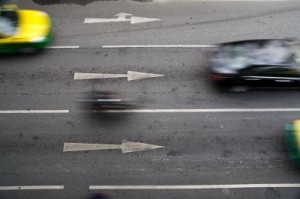Among the solutions to cars speeding on neighborhood streets are rumble strips, those bumpy strips placed along the side of highways which make a lot of noise when a speeding driver crosses them. Many home owners don’t like them, however, for the same reason why they work: they’re noisy. There is a similar problem with speed humps placed in roadways. The people who had been speeding down that road will have to slow way down or avoid the area altogether to avoid them. But people who live in the neighborhood are stuck with them for life and they are very inconvenient, especially if your vehicle rides low to the ground.
Other options for controlling traffic include automated radar detectors, traffic cameras and an increased police presence, each of which has their own fair share of detractors. There is one way of relieving congestion on neighborhood streets that nobody opposes and that is, relieving congestion on major roads so people have no reason to avoid them.
For the most part, people who speed through neighborhoods are doing so because they are using the road as a shortcut to by-pass a more congested route. If city officials can cut down on congestion on specific roads it stands to reason the number of speeding drivers on neighborhood streets might also decline.
Right now Atlanta’s Department of Public Works is working through a plan to modernize its traffic light system. Of the almost 1,000 traffic lights in place around the city, more than 300 have already been updated. These updates have helped improve the flow of traffic and relieved congestion. This is good news for people living in neighborhoods adjacent to those roads who can now get around the city much faster. It has also alleviated the need for other drivers who use those roads to take a short cut through a nearby neighborhood.
The entire project will cost about $18 million to $20 million to complete and another three years, but the city is optimistic it will find the money and get the job done.
And that would be a win-win for everyone.
Image: duron123 / FreeDigitalPhotos.net

 Live Chat
Live Chat






